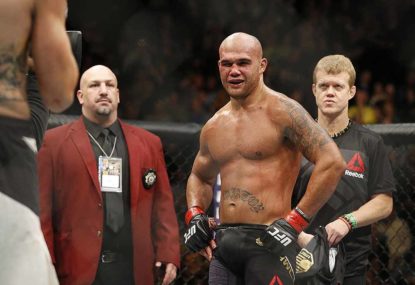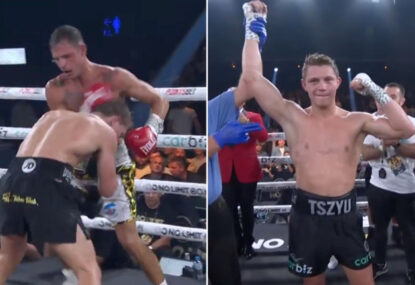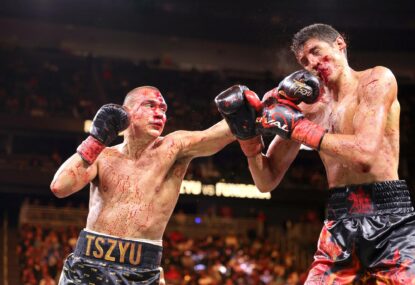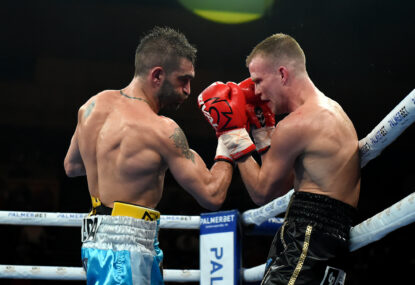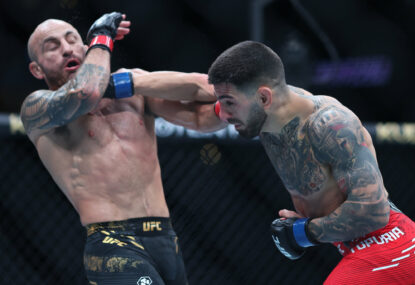After a 2015 UFC season highlighted by seven championships changing hands, many fans, fighters and industry experts have argued that poor judging stopped Carlos Condit from starting 2016 with the company’s first title switch.
Robbie Lawler, the 33-year-old action fighter who currently holds the UFC’s welterweight championship, retained his title. He defeated Condit in a breathtaking five-round bout yesterday inside Las Vegas’ MGM Grand Garden Arena.
Lawler, who extended his record to 27-10, won three of the five rounds according to cage-side judges Derek Cleary and Chris Lee.
Not everyone agreed with the officials’ final scores, though. In fact, very few were in the corner of ‘Ruthless’ Robbie.
MMA Decisions, the fight communities go-to source for judging-related data, quizzed 20 journalists on the outcome after the fight – three scored the fight for Lawler, two had it a tie, and the remaining 15 felt that Condit should be the new UFC welterweight champ.
A quick glance at the stat sheet doesn’t help the 170-pound king’s case either.
Lawler connected with 92 significant strikes over the 25-minute bout – almost half the output of the Jackson-Winkeljohn-trained Condit, who landed 177 blows.
Additionally, the challenger outstruck Lawler in every single round. In the case of the fourth frame, Condit even out-numbered Lawler a whopping 47-6 in significant blows.
The problem is, numbers and stats don’t tell the entire story. Lawler versus Condit was an extraordinarily close fight, a real nail-biter with peaks and valleys from the sound of the opening bell.
When all was said and done, this writer felt Lawler was the deserved winner. On most experts scorecards, the fight hinged on the outcome of the third frame – a cutthroat swing round featuring an aggressive Condit against a plotting Lawler.
‘The Natural Born Killer’ landed more strikes, with a diverse output of kicks, knees and punches, but the bigger punches of the round belonged to the champion.
It’s a real apples or oranges debate. Some prefer the non-stop offensive output from Condit while other value the hard, clean punching from Lawler.
Either way, there was no robbery in Las Vegas, and there is no need to gather your torches and pitchforks.
Well, that’s not entirely accurate. There wasn’t an atrocious decision in the main event, but UFC 195 certainly wasn’t a card without controversy.
Australian mixed martial artist Kyle Noke was a victim of questionable judging on the preliminary portion of the event, dropping a shocking decision to Alex Morono.
Noke engaged in a slugfest with the Octagon newcomer. The two traded blow-for-blow for the bulk of the fight, with the Aussie welterweight getting the better of most exchanges. When the three round fight came to a close, the winner seemed clear.
Not so fast.
Judges Sal D’Amato and Chris Lee surprisingly awarded the fight to Morono. Patricia Morse Jarman, the lone dissenting judge, scored all three rounds for Noke.
Another shocker rocked the prelims, with UFC debutant Justine Kish winning a heavily criticised decision.
Kish, who had been battling injuries for the past two years, aggressively stalked Ansaroff in Vegas, eating three punches to land one of her own for most of the undercard match.
But, of course, you know how this story ends. The Ultimate Fighter cast-off moved her unblemished record to 5-0 and handed Ansaroff her second-straight UFC loss.
Glenn Trowbridge and Junichiro Kamijo each scored the fight 30-27 for Kish – meaning they awarded the former kickboxer all three rounds.
It’s disconcerting that we’re only a few days into 2016 and the topic of conversation on the tip of everyone’s tongue is already controversial fight tallies.
The sport has always been plagued by terrible scorecards. Dating back to 1995 when the UFC first employed judges, there has been bickering over fight outcomes.
20 years later, it’s still a problem, and one that will never truly be eradicated, but a little accountability could go a long way toward cleaning up the sport’s judging crisis.
It seems that the only time a judge’s feet get held to the flames for doing a questionable, and sometimes terrible, job, is on the internet.
By all accounts, it doesn’t stop repeat offenders from getting judging gigs with their states athletic commissions or even a spot on the UFC’s hand-picked judging panel for international events.
One of the most disputed decisions of 2015 was a welterweight bout between recently retired Irish-American Cathal Pendred and Sean Spencer.
Judges Eric Colon, Douglas Crosby, and David Ginsberg gifted Pended the victory, but few outside of his list of immediate friends and family believed it was a fair call.
But if you thought lodging one of the most outrageous scorecards in UFC history would get you blackballed from calling major fights – or at the very least, some form of punishment – you’d be incredibly naive.
All three have been deciding judges in matches for big promotions since, with Colon and Crosby even getting assignments on UFC broadcasts.
Until this seemingly neverending trend ceases, you can expect more of the same in the UFC, Bellator, or anywhere else noteworthy fights are sanctioned.





























































































